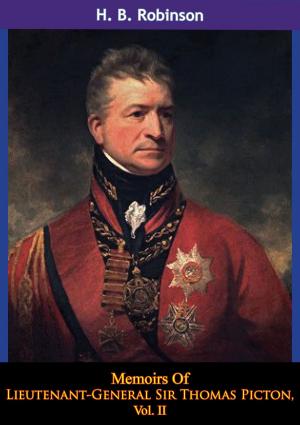Nelson And His Captains: Sketches Of Famous Seamen [Illustrated Edition]
Nonfiction, History, Spain & Portugal, France, Military| Author: | William Henry Fitchett | ISBN: | 9781786253736 |
| Publisher: | Wagram Press | Publication: | November 6, 2015 |
| Imprint: | Wagram Press | Language: | English |
| Author: | William Henry Fitchett |
| ISBN: | 9781786253736 |
| Publisher: | Wagram Press |
| Publication: | November 6, 2015 |
| Imprint: | Wagram Press |
| Language: | English |
Includes 11 portraits
NELSON is the only figure amongst the great sea-captains of the Napoleonic war of which the human memory keeps any vivid image. The iron face of Jervis looks out on us for a moment from the smoke of St. Vincent, gloomy, stern, and cynical, and then vanishes! Collingwood, who led down on the Franco-Spanish line at Trafalgar in a fashion so stately, and in advance even of Nelson, and who lies in the great crypt of St. Paul’s beside his famous chief, is, for the general reader, little more than a name. Cornwallis, the hero of the tireless and memorable blockade of Brest, is scarcely even a name. Who remembers aught of Barham, the white-haired veteran—sea-dog, as well as sea-lord—who devised, almost off-hand, the counter-stroke that shattered Napoleon’s sea strategy and made Trafalgar possible?
Nelson is the one sea-captain of the Great War who has stamped his image imperishably on the imagination of the English-speaking race.
Whether, indeed, Nelson was in a technical sense “the greatest sailor since the world began,” need not be discussed. In the art of taking care of ship and canvas in rough weather some of his own captains probably surpassed him. In the genius that wielded fleets he was supreme! And in the great drama of Napoleonic wars there are —for the man in the street—only three supreme names, that of Napoleon himself, of Wellington, and of Nelson, and Nelson was as great on sea as his two rivals in fame were great on land.
This work is an account, not so much of Nelson as of his captains—the men of the Nile and of Trafalgar. “They,” said Nelson, of a group of his captains, “are my children; they serve in my school, and I glory in them.” And we cannot understand the “school” without some clear mental image of the master who stamped his impress so deeply on it.
Includes 11 portraits
NELSON is the only figure amongst the great sea-captains of the Napoleonic war of which the human memory keeps any vivid image. The iron face of Jervis looks out on us for a moment from the smoke of St. Vincent, gloomy, stern, and cynical, and then vanishes! Collingwood, who led down on the Franco-Spanish line at Trafalgar in a fashion so stately, and in advance even of Nelson, and who lies in the great crypt of St. Paul’s beside his famous chief, is, for the general reader, little more than a name. Cornwallis, the hero of the tireless and memorable blockade of Brest, is scarcely even a name. Who remembers aught of Barham, the white-haired veteran—sea-dog, as well as sea-lord—who devised, almost off-hand, the counter-stroke that shattered Napoleon’s sea strategy and made Trafalgar possible?
Nelson is the one sea-captain of the Great War who has stamped his image imperishably on the imagination of the English-speaking race.
Whether, indeed, Nelson was in a technical sense “the greatest sailor since the world began,” need not be discussed. In the art of taking care of ship and canvas in rough weather some of his own captains probably surpassed him. In the genius that wielded fleets he was supreme! And in the great drama of Napoleonic wars there are —for the man in the street—only three supreme names, that of Napoleon himself, of Wellington, and of Nelson, and Nelson was as great on sea as his two rivals in fame were great on land.
This work is an account, not so much of Nelson as of his captains—the men of the Nile and of Trafalgar. “They,” said Nelson, of a group of his captains, “are my children; they serve in my school, and I glory in them.” And we cannot understand the “school” without some clear mental image of the master who stamped his impress so deeply on it.
![Cover of the book Nelson And His Captains: Sketches Of Famous Seamen [Illustrated Edition] by William Henry Fitchett, Wagram Press](https://www.kuoky.com/images/2015/november/500x500/9781786253736-0YSn_500x.jpg)



![Cover of the book The Life of Nelson - Vol. I [Illustrated Edition] by William Henry Fitchett](https://www.kuoky.com/images/2011/february/300x300/9781908692412-igWY_300x.jpg)










